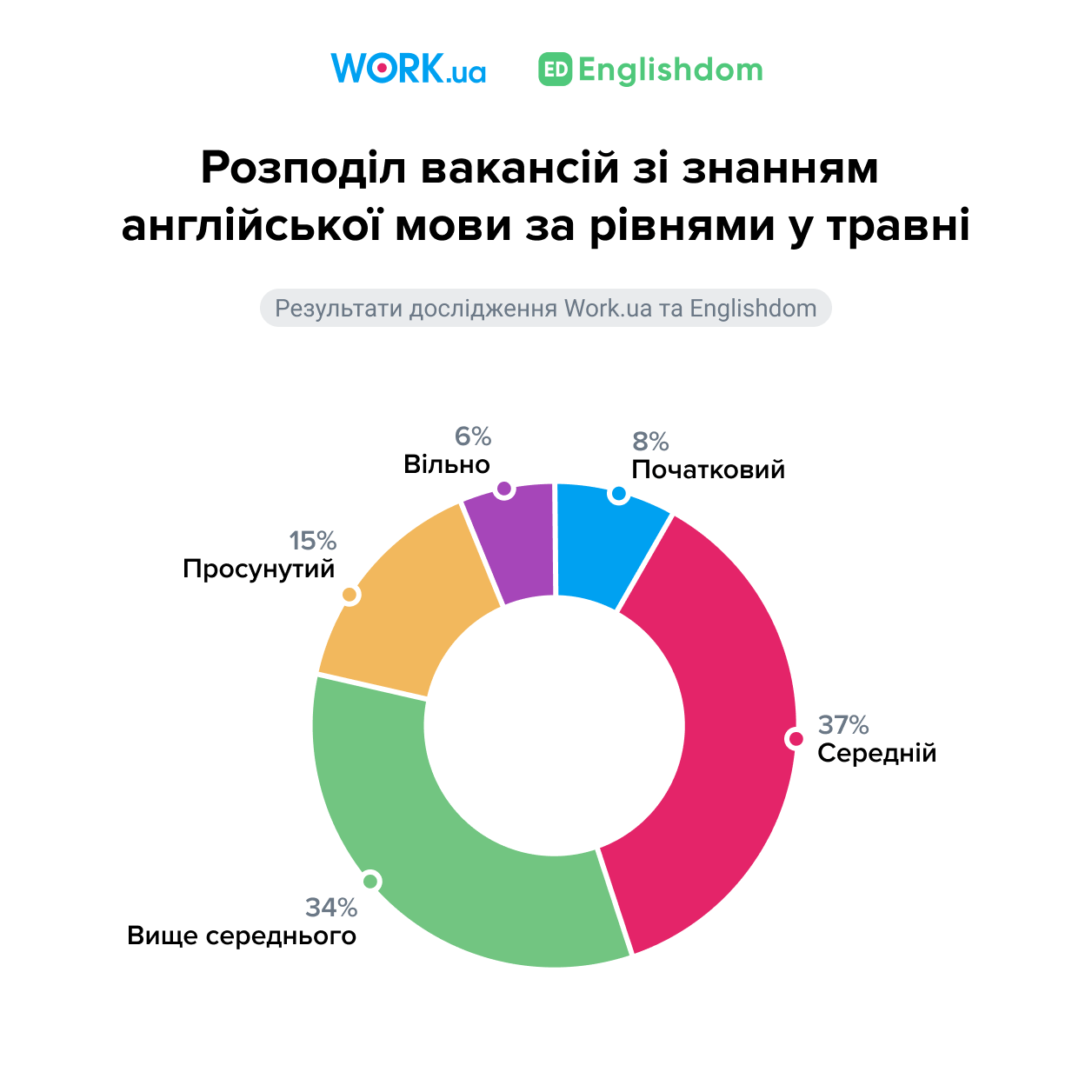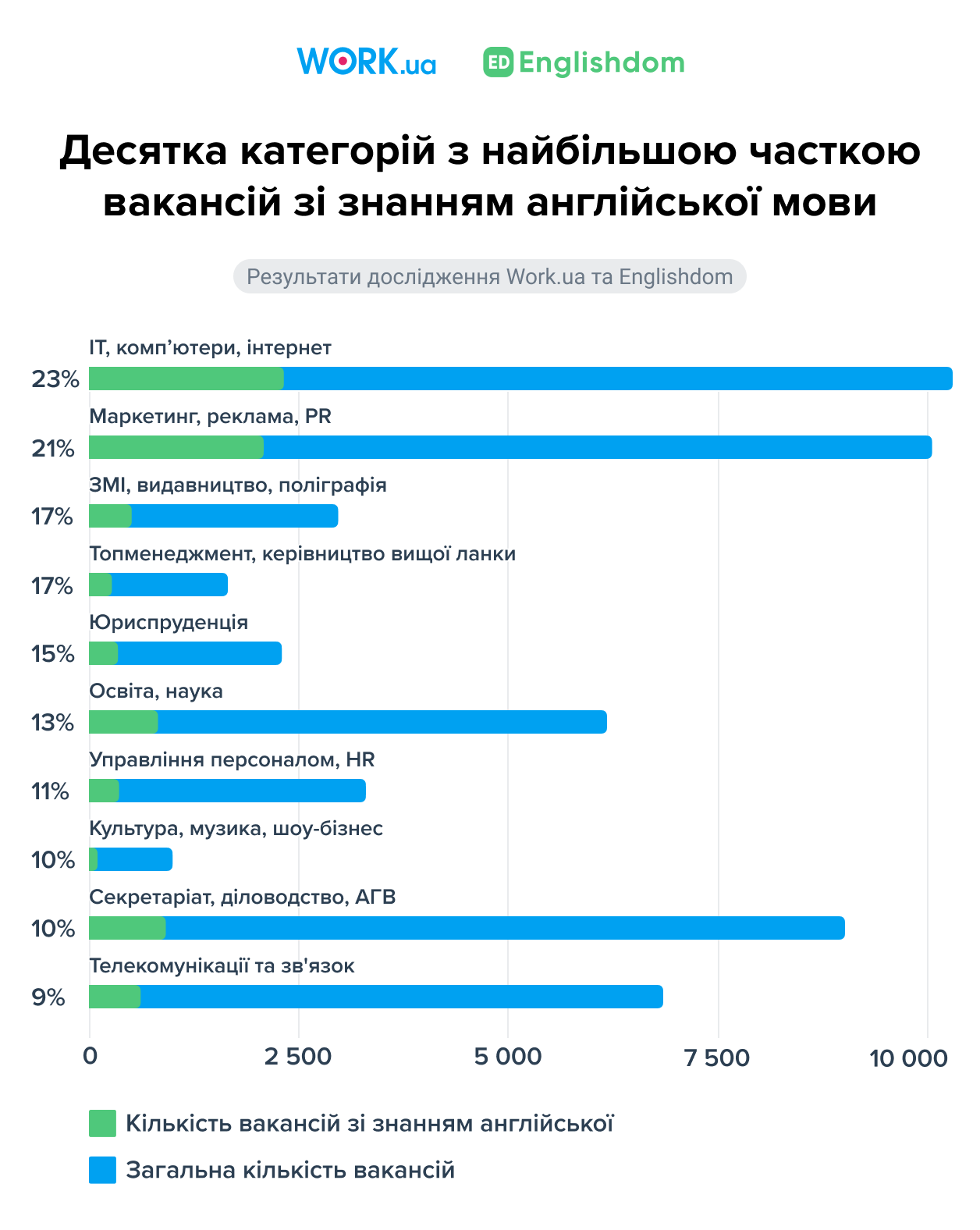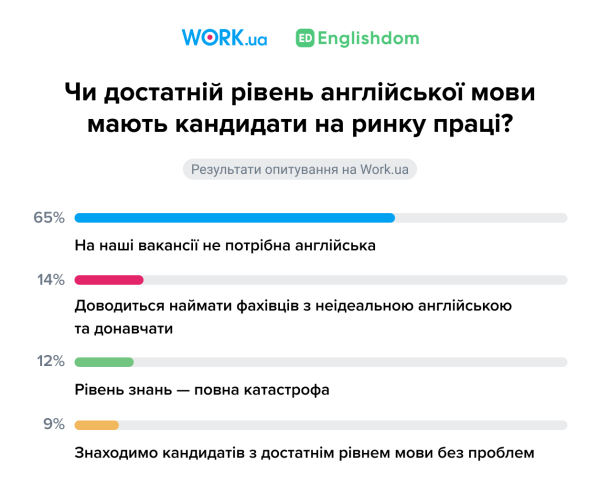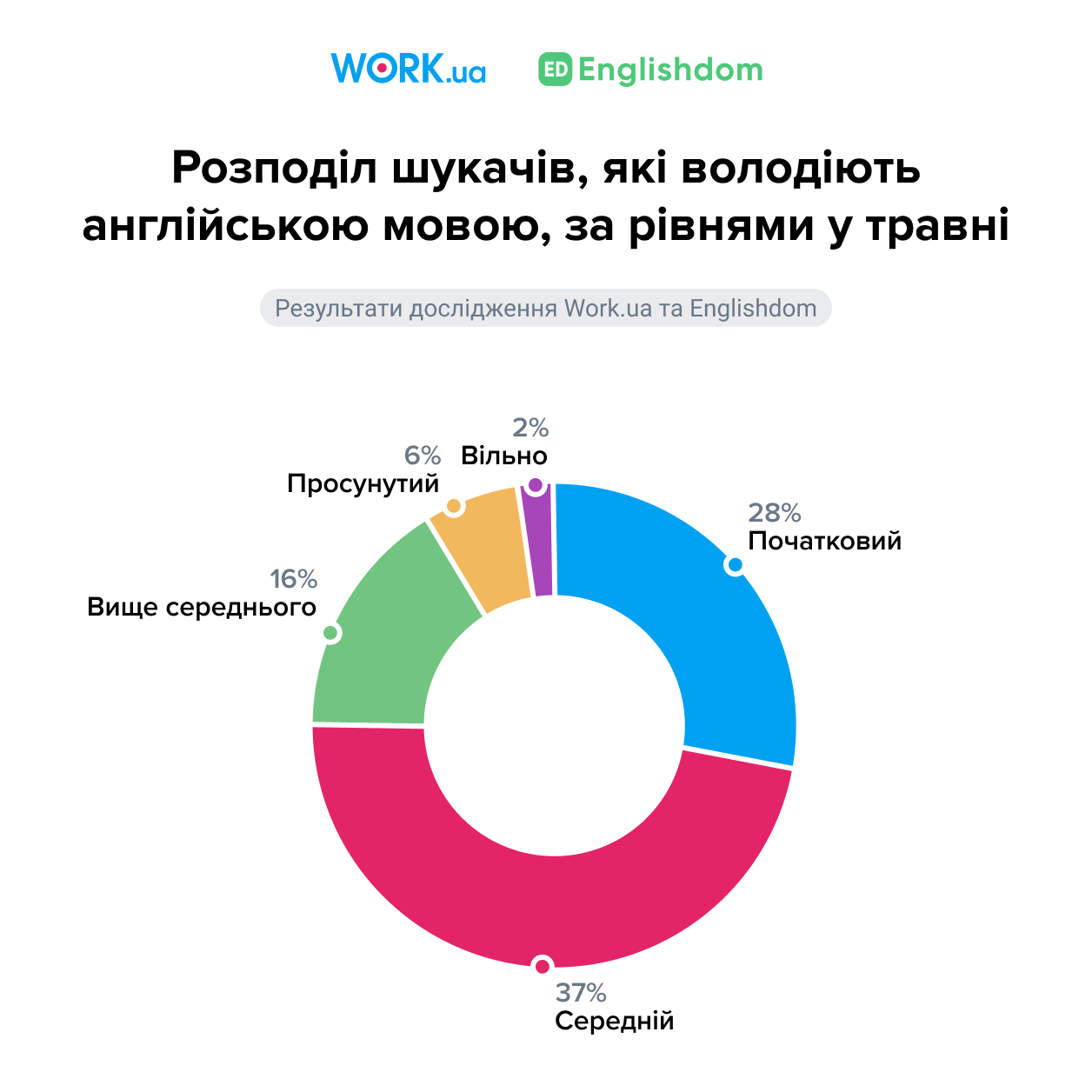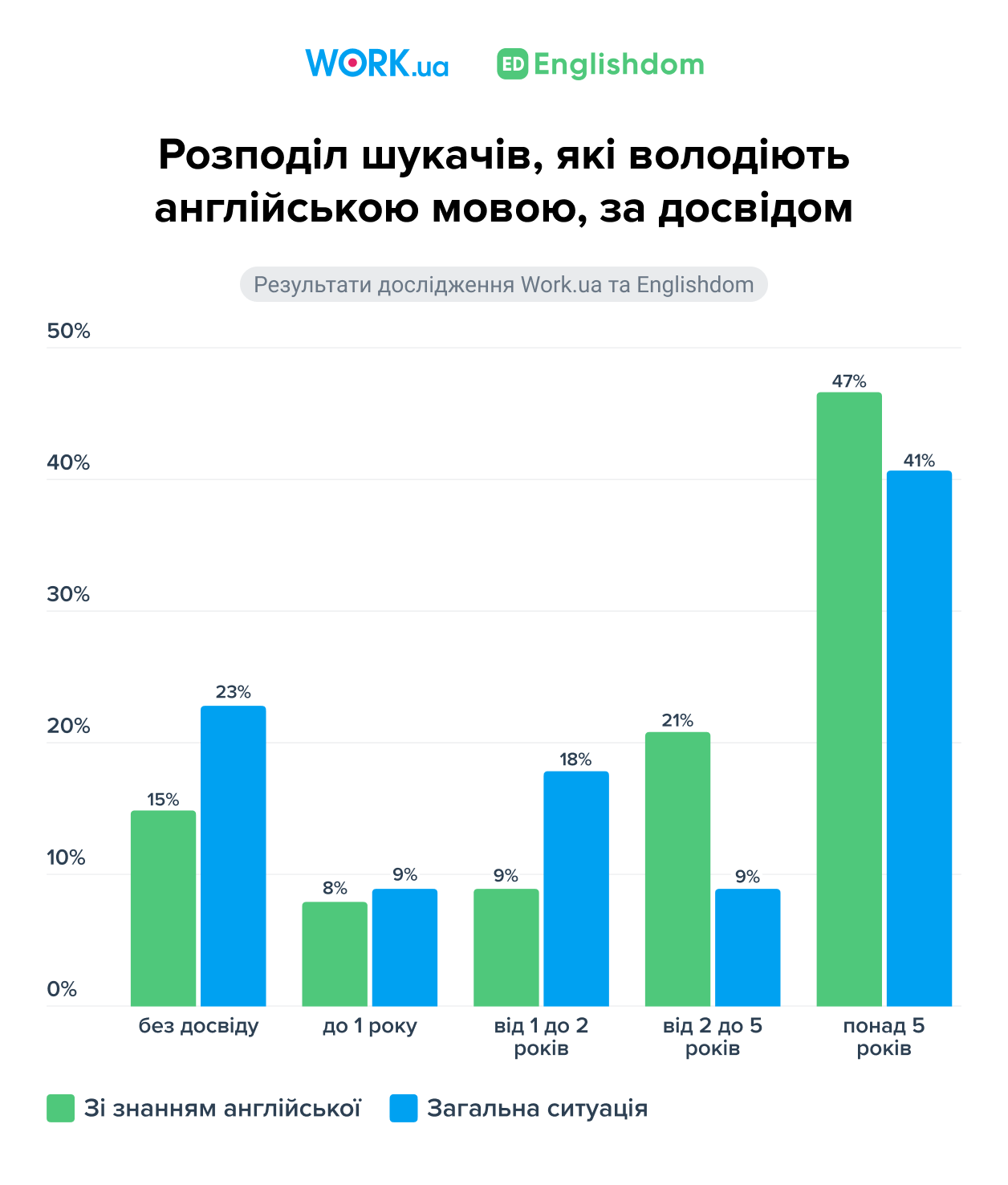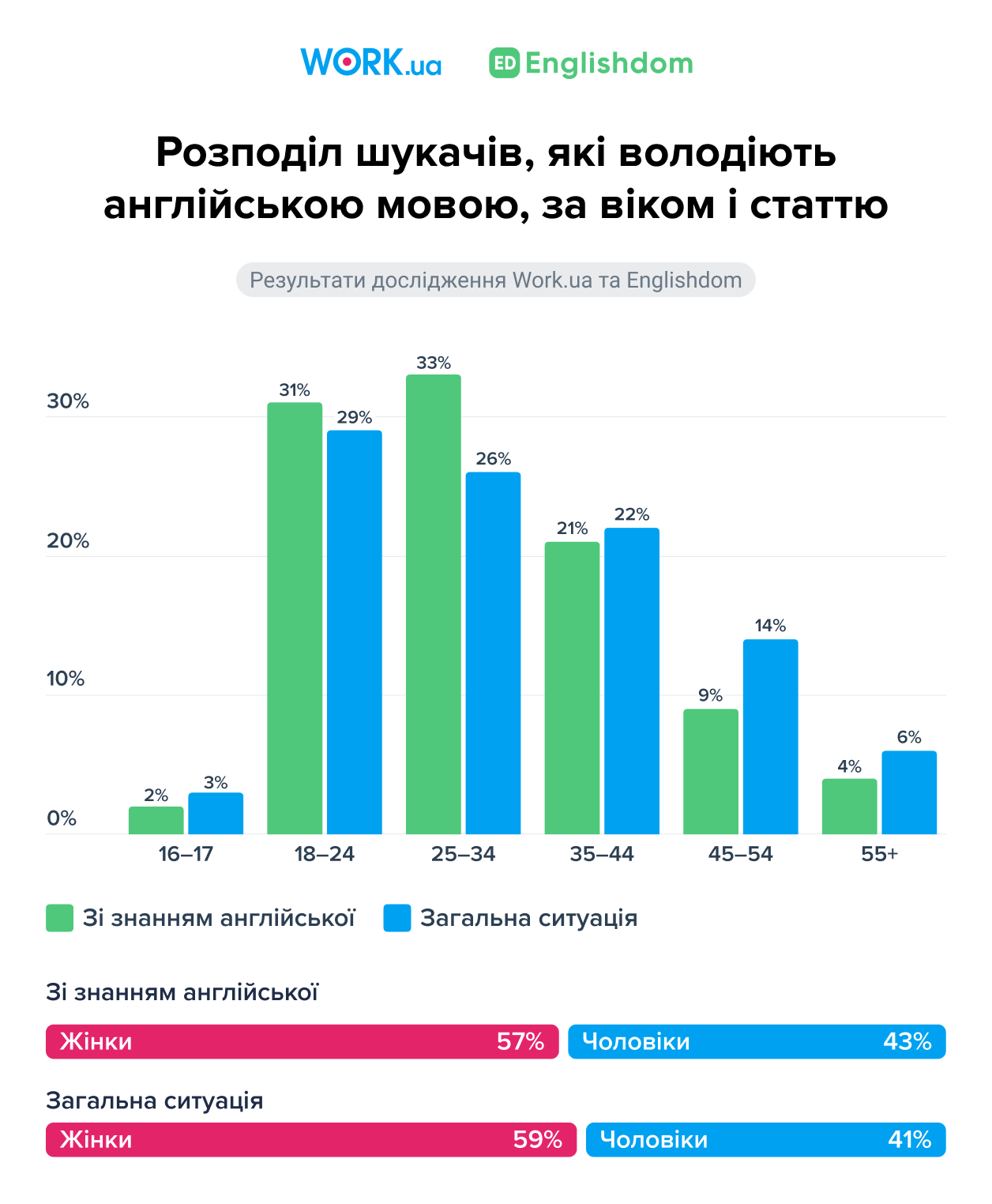How English affects the labor market in Ukraine
English opens all doors. But does this rule apply to the labor market? Work.uafound out whether Ukrainians have a sufficient level of the language and why job offers requiring English language skills receive twice as many responses from candidates.
Ukraine has recently adopted a law on the use of the English language. It provides for the official recognition of English as one of the languages of international communication in the country. A number of positions can be held only if you speak it.
But what about the general labor market? Can we say that English is indispensable? And is it possible to earn more if you achieve the coveted B2 level? What about employers - is it easy for them to find candidates with sufficient English? To find answers to these questions, the job search site Work.ua and the online English school Englishdom conducted a joint study.
6% of job offers require job seekers to be proficient in English
In May 2024, employers published 10,042 unique job offers on Work.ua that required English language skills. This is almost 6% of all job offers on the labor market during this period. At first glance, this is a small figure. However, the English factor has a significant impact on a number of indicators, such as salary and competition.
In their job postings, employers indicate what level of language proficiency they expect from the applicant:
- Elementary - according to other classifications, also A1-A2, Beginner, Elementary.
- Intermediate - A2-B1, B1, Pre-Intermediate, Intermediate.
- Above intermediate - B2, Upper-Intermediate.
- Advanced - C1, Advanced.
- Fluent - C2, Proficiency.
The most popular levels in the labor market are intermediate and above intermediate. However, language proficiency at the elementary level gives few advantages. See the graph below for more details.
IT and management positions - who can't do without English
Who can't get a dream job without English, and where is it practically useless? To find the answer, we analyzed the distribution of vacancies requiring English by category and found out where the share of such job offers is higher.
As you can see, English is most in demand among IT professionals, marketers, publishing workers, and executives. These four categories account for almost half of all job postings requiring English.
There are also a lot of jobs requiring English in the categories of Sales, Procurement (1,639 offers) and Administration, Middle Management (1,154). But this is only 7% of vacancies in each category.
Instead, the smallest share of vacancies requiring English skills is seen in the following categories:
- "Transport, auto business" - 2% of the total number of vacancies in the category (274 job offers);
- "Beauty, fitness, sports - 2% (94);
- "Service sector - 2% (519);
- "Security, safety" - 2%, (99);
- "Working specialties, production" - 1%, (282);
- "Retail trade - 1%, (118).
There are some other interesting findings regarding the categories where job seekers are expected to know English:
- Elementary level of the language is most relevant in the Retail category - 39% of vacancies with English require this level of English from job seekers.
- Theintermediate level is relevant for the categories of "Working specialties, production" (55%), "Construction, architecture" (55%), "Design, creativity" (53%), and "Service sector" (52%).
- The"above average" level is most in demand in the categories of Top Management, Senior Management (41%), Telecommunications and Communications (41%), Logistics, Warehouse, Foreign Trade (41%).
- Learning English to an advanced and fluent level is most important for job seekers in the Education, Science category (30% and 15% respectively). These are job offers for translators and English teachers.
Charitable organizations are most interested in English-speaking employees
We also analyzed the relationship between the business sector and English language requirements. It turned out that the largest share of vacancies with a language requirement is in the nonprofit sector:
- "Non-profit, charitable, and public organizations" - 34% of all job offers in this category, 746 vacancies;
- "IT" - 33%, 1,785;
- "Marketing, advertising, PR - 22%, 876;
- "Consulting, accounting, auditing - 21%, 212;
- "Tourism - 21%, 92;
- "Law - 16%, 184.
The fact that non-profit organizations are the leaders in this ranking is explained by the fact that they are often representatives of international foundations and companies or actively cooperate with them.
The analyzed trends in categories and industries are synchronously reflected in corporate English learning. According to the Englishdom online school, the most frequent clients for English teaching services for employees are companies in the IT, wholesale and retail sectors, and charitable organizations.
From sales manager to SEO specialist: what positions does the labor market offer to job seekers with good English?
In what professions can Ukrainians with a good command of a foreign language realize their potential? In terms of individual positions, the largest number of vacancies are offered to the following specialists:
- sales manager - 832 vacancies
- marketer - 430;
- Customer service manager - 427;
- English teacher - 407;
- project manager - 330;
- accountant - 260;
- HR manager - 250;
- technical support specialist - 250;
- Head of the legal department - 228;
- logistician - 223.
The market also offers a lot of vacancies requiring English to foreign trade managers, financial analysts, SEO specialists, etc.
More than a third of vacancies requiring English are remote work
The ability to work remotely is the most desired benefit of job seekers in the labor market. Work.ua talked about this in another study. Also, monthly analytics show that competition for remote positions is 5 times higher than the market average.
So the good news for English-speaking job seekers is that 38% of vacancies requiring foreign language proficiency involve remote work.
For comparison, there are less than 7% of remote job offers on the labor market as a whole.
Among offline job offers, the top five regions are the same as in the labor market as a whole. These are Kyiv (3,747 vacancies), Lviv (647), Dnipro (375), Odesa (391), and Kharkiv (144) regions.
The competition for positions with English is twice as high. Why is this so?
We asked employers whether their job seekers have a sufficient level of English and whether it is easy for them to find candidates. As expected, most of them said that their vacancies do not require this skill. However, those companies looking for English-speaking candidates mostly face difficulties.
The survey was conducted in June 2024. It involved 1292 employers.
Moreover, Work.ua's industry-specific research, such as labor market analytics for the legal sector, shows that requiring English language skills in a job posting significantly reduces the number of candidates responding to it.
At the same time, the figures show that the average competition for vacancies requiring English is twice as high as the average competition in the labor market as a whole. This seems to contradict the previous theses. But there are several explanations for this:
- The lion's share of vacancies requiring English is remote work. As we have already noted, such jobs receive five times more responses.
- In absolute terms, the largest number of English jobs are offered for IT and marketing professionals. These are highly competitive categories, where job seekers send hundreds of resumes for some positions.
- At the same time, categories with traditionally low competition, such as "Working specialties, production" are practically not represented here.
Finally, such positions are usually perceived by people as prestigious, which causes competition. Another factor is the size of the salary, which will be discussed below.
At the same time, job seekers admit that they are often forced to turn down tempting offers because their English is not good enough.
The survey was conducted in June 2024. It involved 2083 job seekers.
Earning twice as much as your colleagues: how English affects salaries
In May, the average salary in Ukraine, according to Work.ua, was UAH 20,000. But in jobs where applicants are expected to know English, it was UAH 28,000. So, on average, knowledge of a foreign language allows you to earn 40% more.
This difference is most noticeable in the following categories:
- "Finance, Banking" - salaries with knowledge of English are UAH 35,000, +100% to the average salary in the category;
- "Logistics, warehouse, foreign trade - UAH 35,000, +79%;
- "Accounting, Audit - UAH 30,000, +62%;
- "Working specialties, production" - UAH 32,300, +62%;
- "Agriculture, agribusiness - UAH 32,500, +51%;
- "Design, creativity - UAH 31,000, +48%;
- "Transportation, auto business - 40,000 UAH, +45%.
Interestingly, this list includes the categories with the smallest share of vacancies surveyed, such as "Working specialties, production". Here, English is expected from highly skilled professionals, in particular, engineers.
We also see a clear pattern: the higher the language level, the higher the salary. On average, job seekers can claim the following income depending on their level:
- beginner - 22,000 UAH
- intermediate - 25,000 UAH
- above average - 30,000 UAH;
- advanced - 32,500 UAH;
- free - UAH 35,000.
This trend can be seen in almost every category. For example, in the category of Construction, Architecture, specialists with knowledge of English are offered UAH 35,000 on average. This is 40% higher than the average salary in the category of UAH 25,000. A more detailed analysis shows that as the requirements for English increase, so do the salaries in the vacancies:
- entry-level - 30,000 UAH
- intermediate - 35,000 UAH
- above average - 47,500 UAH;
- advanced - 49,975 UAH;
- fluent - 53,250 UAH.
But forsome specialists, English allows them to earn even twice as much as their colleagues! In the context of individual professions, the most noticeable difference in income for the following positions:
- Sales representative - salary with knowledge of English 60,000 UAH, +100% to the average salary for the position on the market;
- Head of HR - UAH 75,000, +88%;
- logistics dispatcher - UAH 45,000, +75%;
- Head of Legal Department - UAH 32,500, +63%;
- product manager - 55,000 UAH, +47%;
- Head of department - UAH 51,000, +46%;
- Head of Sales - 70,000 UAH, +40%;
- waiter - 25,000 UAH, +39%;
- web designer - 40,000 UAH, +38%.
Of course, the salary is influenced not only by English, but also by a number of other factors, such as hard and soft skills, experience, etc. However, language proficiency is definitely a necessary factor to apply for such jobs and earn more.
A quarter of job seekers speak English, but their level does not always meet employers' expectations
A quarter of candidates (26%) on the labor market indicated in their resumes that they speak English. This seems to be a very high number compared to 6% of vacancies where this skill is expected. However, the surveyed job seekers indicated that they have repeatedly faced job rejections due to inadequate language skills. In the end, they simply stopped responding to such job offers.
The survey was conducted in June 2024. It involved 1205 job seekers.
This is due to the fact that the level of language proficiency stated in job seekers' resumes is lower than the expectations of employers. For example, 28% of the candidates who know English have a beginner level. But this level is sufficient for only 8% of vacancies requiring English.
Educators and programmers: who demonstrates a high level of language
The distribution of English-speaking job seekers is uneven not only by level but also by category. Employers are most likely to find a candidate with this skill in the following categories:
- "IT, computers, Internet" - 44% of all applicants in the category;
- "Media, publishing, printing - 42%;
- "Design, creativity - 42%;
- "Marketing, advertising, PR - 39%;
- "Culture, Music, Show Business, Top Management, Senior Management - 36%.
IT job seekers are leading not only in terms of share but also in absolute numbers: 9,637 IT professionals indicated in their resumes that they speak English. They are also among the leaders among job seekers with intermediate and above average levels.
However, among job seekers with elementary English, the majority of them are in the category of "Administration, middle management". The highest level of language - advanced and fluent - is boasted by candidates in the Education, Science category.
However, recruiters may face the greatest difficulties in finding candidates with English in the following categories:
- "Working specialties, production" - 17% of job seekers here indicated their language skills in their resumes;
- "Service sector - 16%;
- "Retail - 14%;
- "Transportation, automotive business - 13%;
- "Security, safety" - 12%.
Ukrainians abroad and Kyiv residents: which candidates are easier to find English-speaking
When posting a resume on Work.ua, job seekers indicate their preferred city of work. We analyzed how geography affects English proficiency. The highest proportion of English-speaking candidates is among those who indicated their desired job location as "Other countries" - 48% of such job seekers speak English.
There is also a significant share of English-speaking candidates among those who are looking for work remotely - 42%. However, among people considering offline work, the largest share of those who speak English is in Kyiv (31%), Odesa (29%), Lviv (28%), Kharkiv (28%), and Chernivtsi (25%) regions.
Instead, the smallest share of candidates with English is in Poltava (20%), Chernihiv (19%), and Kirovohrad (19%) regions.
Job seekers who speak a foreign language are younger and more experienced
In its monthly surveys, Work.ua analyzes certain characteristics of candidates. First of all, work experience. It turned out that there are more experienced candidates among job seekers who indicated their English skills in their resumes.
There are also more young people under 35 among candidates who speak English. And the gender distribution is the same as in the labor market as a whole. However, it is interesting to note that according to Englishdom, 65% of students are women versus 35% of men.
Salary appetites are growing as English is improved
English is a valuable skill in the labor market. Job seekers realize this and reflect it in their salary expectations.
For example, candidates with a beginner and intermediate level of English are looking for an income of UAH 20,000. At the "above average" level, the desired salary is already UAH 21,000. Having improved their language to an advanced or fluent level, Ukrainians on average raise their salary expectations to UAH 25,000.
English as a Benefit: Do Employers Encourage Employees to Learn English?
Employers claim that the level of English of job seekers is insufficient, but do they help their employees improve their knowledge? A survey of 564 employers found that 27% of companies encourage employees to learn the language through corporate English.
Students from over 700 companies study at Englishdom. The analytics show who contributes to employee development and how:
- Almost half of the employers providing such benefits to employees are large companies with more than 1,000 employees.
- By industry, the majority of companies that teach employees English at Englishdom are from the IT sector, wholesale and retail trade, light industry, agriculture, and charitable organizations.
- Professional development is the main request from companies. At the same time, many employers aim to unite the team, motivate and loyalize employees to the company, and enhance the employer's brand.
- Among the employees who are taught English by employers are IT specialists, sales managers, top management, HR, marketers, etc.
- On average, company employees spend 6 hours a month learning the language.
English opens up many paths in the labor market: from the IT industry, which is a dream for many, to the ability to work remotely. And, of course, to earn 40% more than your colleagues. So we wish job seekers inspiration in learning English, and employers as many relevant candidates as possible.
Yevheniia Kuzenkova, editor at Work.ua.
Buhgalter 911 notes that the content of the author's materials may not coincide with the policy and opinion of the editorial team. The authors of the published materials include not only representatives of the editorial team.
The information presented in a particular publication reflects the position of the author. The editorial team does not interfere with the author's materials, does not edit the texts, and is therefore not responsible for their content.
